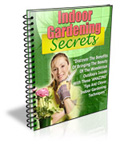Welcome to Gardening Guide
Gardening Organic Pest Article
 . For a permanent link to this article, or to bookmark it for further reading, click here.
. For a permanent link to this article, or to bookmark it for further reading, click here.
Organic Gardening Pest Control
from:The idea of organic gardening pest control is not a new theory, and in fact is as old as agriculture. The problem is that since World War II organic pest control has been replaced in civilized countries with man-made pesticides that are detrimental to both the environment and to the people who consume the plants on which the products are sprayed. Today people are returning to organic gardening pest control and choosing to reject, or at least restrict, the use of man-made pesticides. There are varying beliefs on the use of these products, with some people opposing their use only on food crops, whereas others simply try to reduce their use as much as possible.
Many different reasons make logical sense for utilize organic gardening pest control methods. One of the most important is that because insect pests are left alone genetically because of the absence of pesticides, they are not in a position to become resistant “super bugs.” Organic methods tend to be less polluting and blend into the ecosystem around it instead of disrupting it. In addition, because many of the pesticides that are available are derivatives of petrochemicals, their costs are higher, thus making alternatives more attractive. Whatever the reasons may be for avoiding their use, the organic gardener has to be prepared to work in order to make up for the loss of those chemical products that he chooses to abstain from using.
Organic gardeners have several effective, non-chemical methods that they can utilize to control garden pests. One of the easiest ways to avoid pest problems is by varietal selection, which entails choosing seed varieties that have been bred to be resistant to pests and diseases. The cultural control method of organic gardening pest control involves changing your gardening methods in order to reduce the hospitality that your garden offers to pests. This may mean removing or burning diseased plant material and destroying weeds and plan debris that provide hiding places for insects. Using stakes to keep fruits off the ground as well as pruning to remove diseased limbs, removing sickly plants, proper building of the soil, and making sure the plants are in raised areas in rainy seasons also help control diseases and pests. Crop rotation can also help in the prevention of disease and in pest control.
Using non-pesticide methods for pest control may not be as quick as the use of pesticides, but it is safer and over time, these methods will not simply repel the insects for the current season but prevent their reappearance in other corps. Organic gardening pest control may be a longer process, but it is well worth the effort.
.
Gardening Organic Pest News



